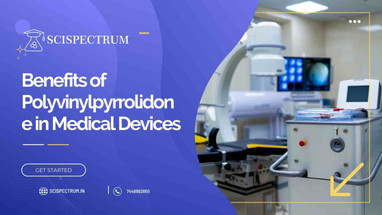Posted by Scispectrum on 22nd Aug 2025
Polyvinylpyrrolidone (PVP) in Medical Devices: Enhancing Performance and Biocompatibility
The medical device industry continually seeks innovative materials that improve patient outcomes while ensuring safety and efficacy. Polyvinylpyrrolidone (PVP) in Medical Devices, a versatile synthetic polymer, has emerged as a critical component in a wide range of medical devices, from drug delivery systems to implantable devices.
This article explores the remarkable benefits of PVP in medical applications, delving into its properties, key applications, and the reasons behind its widespread use in this demanding field.
Understanding PVP: A Versatile Polymer with Remarkable Properties
PVP, also known as povidone or polyvidone, is a synthetic polymer derived from the monomer N-vinylpyrrolidone. It is available in various molecular weights, ranging from low to ultra-high, allowing for tailored properties to suit specific applications.
Key Properties of PVP that Make it Ideal for Medical Devices:
- Biocompatibility: PVP exhibits excellent compatibility with human tissues and fluids, minimizing the risk of adverse reactions or rejection by the body.
- Solubility: PVP readily dissolves in water and other polar solvents, making it easy to process and incorporate into various formulations.
- Film-Forming Ability: PVP forms thin, transparent, and flexible films, making it suitable for coatings and drug delivery matrices.
- Adhesion: PVP exhibits good adhesion to various surfaces, including metals, plastics, and biological tissues.
- Lubricity: PVP acts as a lubricant, reducing friction between surfaces, which is crucial for devices like catheters and guidewires.
Key Applications of PVP in Medical Devices
The unique properties of PVP have led to its widespread adoption in a diverse range of medical device applications:
- Drug Delivery Systems:
- Controlled Release: PVP can control the release rate of drugs from tablets, capsules, and implants, ensuring a sustained therapeutic effect and reducing the frequency of administration.
- Bioavailability Enhancement: PVP can improve the solubility and dissolution rate of poorly soluble drugs, enhancing their absorption and bioavailability.
- Drug Eluting Stents: PVP is used as a drug carrier in drug-eluting stents, where it gradually releases anti-restenotic drugs to prevent blood vessel re-narrowing after angioplasty.
- Implantable Devices:
- Coatings for Catheters and Guidewires: PVP coatings reduce friction, improving patient comfort and ease of insertion for catheters and guidewires.
- Biocompatible Coatings for Implants: PVP coatings on implants, such as stents and orthopedic devices, improve biocompatibility and reduce the risk of inflammation or foreign body reactions.
- Wound Care and Tissue Engineering:
- Hydrogels: PVP is a key component in hydrogels, which are three-dimensional networks of polymers that can absorb and retain large amounts of water. These hydrogels are used as wound dressings, drug delivery vehicles, and scaffolds for tissue engineering.
- Bioadhesives: PVP-containing formulations are used as surgical adhesives and tissue sealants, offering strong adhesion and biocompatibility.
- Ophthalmic Applications:
- Contact Lenses: PVP is used in contact lens solutions to improve lubrication, increase comfort, and enhance the wettability of the lens surface.
- Ophthalmic Viscosurgical Devices (OVDs): PVP is a component in OVDs, which are used during eye surgery to protect and lubricate delicate eye tissues.
Advantages of Using PVP in Medical Devices
The widespread use of PVP in the medical device industry stems from its numerous advantages:
- Enhanced Safety and Biocompatibility: PVP’s excellent biocompatibility profile minimizes the risk of adverse reactions, making it suitable for long-term use in contact with the body.
- Improved Device Performance: PVP’s unique properties, such as lubricity, adhesion, and film-forming ability, contribute to improved device performance, ease of use, and patient comfort.
- Tailorable Properties: The availability of different molecular weights of PVP allows manufacturers to fine-tune its properties to meet the specific requirements of various medical devices.
- Cost-Effectiveness: PVP is a relatively cost-effective material compared to some alternatives, making it an attractive option for medical device manufacturers.
Conclusion: A Versatile Polymer Shaping the Future of Medical Devices
Polyvinylpyrrolidone has earned its place as a cornerstone material in the medical device industry. Its remarkable versatility, biocompatibility, and ability to enhance device performance have led to its incorporation into a wide range of products that are improving patient care across various medical specialties. As the demand for safer, more effective, and patient-centric medical devices continues to grow, PVP will undoubtedly play an even greater role in shaping the future of healthcare.

